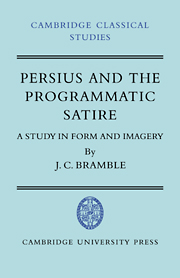Book contents
- Frontmatter
- Contents
- PARENTIBUS OPTIMIS
- Preface
- Abbreviations
- INTRODUCTION
- 1 STYLE AND EXPRESSION IN PERSIUS' FIFTH SATIRE
- 2 THE PROGRAMMATIC SATIRE AND THE METHOD OF PERSIUS I
- 3 THE NATURE AND SOURCES OF PERSIUS' IMAGERY
- 4 PERSIUS' FIRST SATIRE: ANALYSIS
- 5 GRANDEUR AND HUMILITY: JUVENAL AND THE HIGH STYLE
- APPENDIX 1 Accius and Pacuvius at Persius I. 76–8
- APPENDIX 2 Virgil and the moderns at Persius I. 96
- APPENDIX 3 The image of the child in ancient satire and diatribe
- APPENDIX 4 The disclaimer of malice
- TEXT
- TRANSLATION
- 1 INDEX OF MODERN AUTHORS
- 2 INDEX LOCORUM POTIORUM
- 3 INDEX OF IMAGES, TOPICS AND WORDS
4 - PERSIUS' FIRST SATIRE: ANALYSIS
from PARENTIBUS OPTIMIS
Published online by Cambridge University Press: 05 June 2014
- Frontmatter
- Contents
- PARENTIBUS OPTIMIS
- Preface
- Abbreviations
- INTRODUCTION
- 1 STYLE AND EXPRESSION IN PERSIUS' FIFTH SATIRE
- 2 THE PROGRAMMATIC SATIRE AND THE METHOD OF PERSIUS I
- 3 THE NATURE AND SOURCES OF PERSIUS' IMAGERY
- 4 PERSIUS' FIRST SATIRE: ANALYSIS
- 5 GRANDEUR AND HUMILITY: JUVENAL AND THE HIGH STYLE
- APPENDIX 1 Accius and Pacuvius at Persius I. 76–8
- APPENDIX 2 Virgil and the moderns at Persius I. 96
- APPENDIX 3 The image of the child in ancient satire and diatribe
- APPENDIX 4 The disclaimer of malice
- TEXT
- TRANSLATION
- 1 INDEX OF MODERN AUTHORS
- 2 INDEX LOCORUM POTIORUM
- 3 INDEX OF IMAGES, TOPICS AND WORDS
Summary
The first twelve lines tell us that the genre is unpopular, that the Romans have no taste, and that their apparent severity is suspect. Persius begins with a false start, quoting, or giving the illusion of quoting, a line from a supposedly inchoate work on κενο-σπουδία:
O curas hominum! O quantum est in rebus inane!
An interlocutor immediately asks him if he will find an audience for such high-minded moralising, lines 2–3:
‘quis leget haec?’ min tu istud ais? nemo hercule, ‘nemo?’ vel duo vel nemo.
Persius knows that satire is unpopular. But he is undeterred, expressing surprise at the interruption of his thoughts, and remaining confident and nonchalant about the superiority of his tastes. Implied is the Stoic proposition that only the wise man is a good poet: μόνον δέ φασι τον σοφόν και μάντιν αγαθόν εΤναι και ττοιητήν και ρήτορα, Stob. Ecl. vol. II p. 67, Wachsmuth. It follows that the ἄσοφος is necessarily a bad poet. Persius' uncompromising attitude is paralleled by another Stoic text, Sen. Ep. vu. 9, which Summers rightly thinks he imitates:
non est quod te gloria publicandi ingenii producat in medium, ut recitare istis velis aut disputare. quod facere te vellem si haberes isti populo idoneam mercem: nemo est qui intellegere te possit. aliquis fortasse, unus aut alter incidet, et hic ipse formandus tibi erit instituendusque ad intellectum tui.
Besides the general similarity of situation, Persius' modification of nemo to vel duo vel nemo corresponds to Seneca's change, nemo est qui…, to aliquis fartasse, unus aut alter.
- Type
- Chapter
- Information
- Persius and the Programmatic SatireA Study in Form and Imagery, pp. 67 - 155Publisher: Cambridge University PressPrint publication year: 1974

